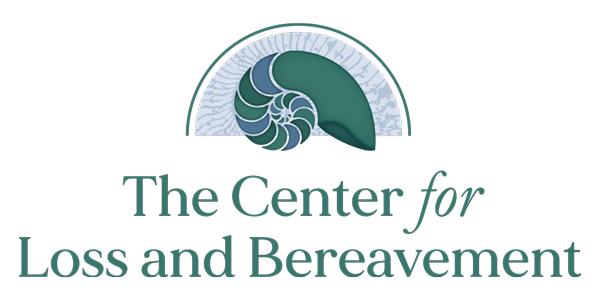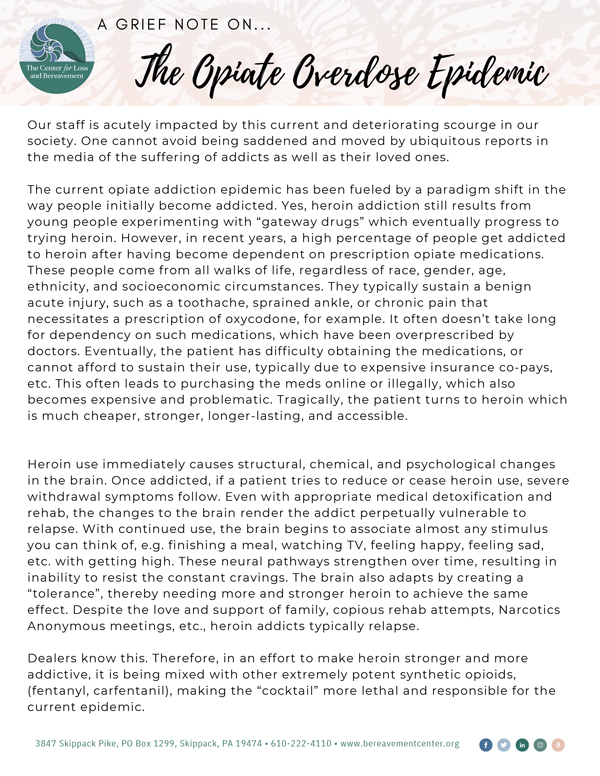CLB Grief Notes
A Grief Note On…
The Opiate Overdose Epidemic
Our staff is acutely impacted by this current and deteriorating scourge in our society. One cannot avoid being saddened and moved by ubiquitous reports in the media of the suffering of addicts as well as their loved ones.
The current opiate addiction epidemic has been fueled by a paradigm shift in the way people initially become addicted. Yes, heroin addiction still results from young people experimenting with “gateway drugs” which eventually progress to trying heroin. However, in recent years, a high percentage of people get addicted to heroin after having become dependent on prescription opiate medications. These people come from all walks of life, regardless of race, gender, age, ethnicity, and socioeconomic circumstances. They typically sustain a benign acute injury, such as a toothache, sprained ankle, or chronic pain that necessitates a prescription of oxycodone, for example. It often doesn’t take long for dependency on such medications, which have been overprescribed by doctors. Eventually, the patient has difficulty obtaining the medications, or cannot afford to sustain their use, typically due to expensive insurance co-pays, etc. This often leads to purchasing the meds online or illegally, which also becomes expensive and problematic. Tragically, the patient turns to heroin which is much cheaper, stronger, longer-lasting, and accessible.
Heroin use immediately causes structural, chemical, and psychological changes in the brain. Once addicted, if a patient tries to reduce or cease heroin use, severe withdrawal symptoms follow. Even with appropriate medical detoxification and rehab, the changes to the brain render the addict perpetually vulnerable to relapse. With continued use, the brain begins to associate almost any stimulus you can think of, e.g. finishing a meal, watching TV, feeling happy, feeling sad, etc. with getting high. These neural pathways strengthen over time, resulting in inability to resist the constant cravings. The brain also adapts by creating a “tolerance”, thereby needing more and stronger heroin to achieve the same effect. Despite the love and support of family, copious rehab attempts, Narcotics Anonymous meetings, etc., heroin addicts typically relapse.
Dealers know this. Therefore, in an effort to make heroin stronger and more addictive, it is being mixed with other extremely potent synthetic opioids, (fentanyl, carfentanil), making the “cocktail” more lethal and responsible for the current epidemic.
As you might expect, the Center has been inundated with bereaved caretakers, family, and friends of heroin overdose victims. The grief process for such people is uniquely difficult and complicated for several reasons. A primary aspect is the almost universal and pervasive feeling of regret, guilt, and sometimes shame of the surviving loved ones, especially parents of the deceased. Under the best of circumstances, it takes months and years for the parents to reconcile, make sense of, and understand “on a gut level” their ultimate powerlessness over their child’s addiction.
The difficulty is magnified tremendously for these mourners due to the fact that this grief is disenfranchised. Disenfranchised grief is one of several forms of complications described by Kenneth Doka, PhD (1989). Disenfranchised grief is not acknowledged or sanctioned by society, due in large part to the stigmatized nature of drug addiction itself. In essence, society continues to view drug addicts as “bad people”, who were raised in “dysfunctional families” who might have enabled them, didn’t give them adequate guidance or support, or who otherwise “failed them”.
Join Our
Mailing List
Donate
Today
Request
Information

Affiliations
• NACG
• CBEM Changemaker
• ADEC
• Charity Navigator
Quick Links
About Us
Individual & Family Grief Counseling
Volunteer
News
Grief Support Resources
Contact
Ph: 610-222-4110
Fax: 610-222-4116
3847 Skippack Pike
P.O. Box 1299
Skippack, PA 19474
Support The Center For
Loss and Bereavement
